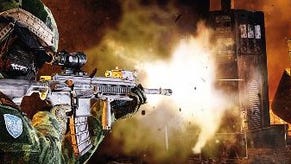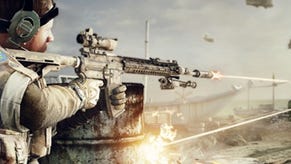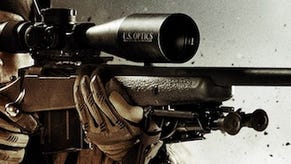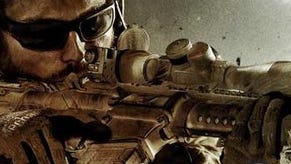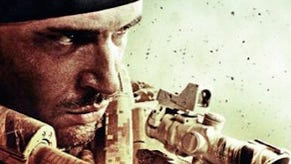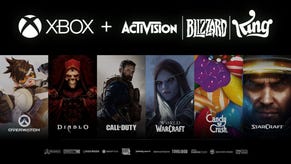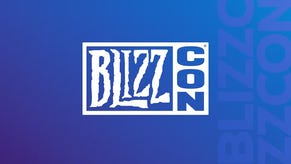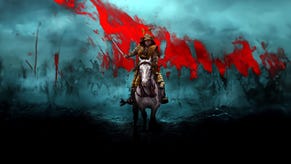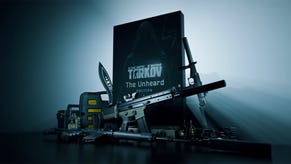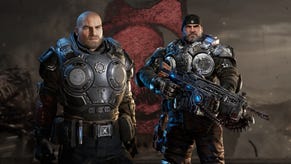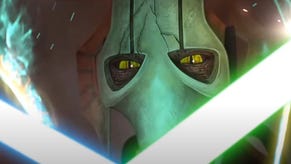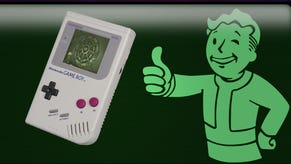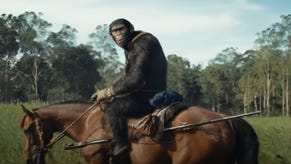Medal of Honor interview: Greg Goodrich on controversy
Medal of Honor: Warfighter's dev boss talks to Patrick Garratt about tomahawks, the Battlefield 4 beta and taking FPS authenticity on a global mission against the bad guys.
"Battlefield 3 players, they’re already combat-trained to play Warfighter. When they come over, when we launch, it’s going to feel familiar because of Frostbite 2 and Battlelog, and it’s just going to be a nice change for them."
Danger Close is no stranger to controversy. The last Medal of Honor, the 2010 shooter responsible for rebooting the IP up to layer-status with Battlefield for EA, ended up in hot water over plans to have its multiplayer opposing force named "Taliban". EA was forced to change it at the eleventh hour. Continuing the theme, a Medal of Honor tomahawk was pulled just before gamescom this year over press concerns.
And now we have DLC based on the hunt for Bin Laden, the latest reveal to cause an internet stink. Danger Close lead Greg Goodrich and his team appear to be pushing the envelope in terms of what's morally acceptable in the war games space, and it's all, he told me at gamescom, in the name breaking down stereotypes, reverence for armed service, and telling the stories some of us may not be comfortable to experience.
Greg was speaking in Cologne last month.
VG247: I’m going to get this out of the way quickly.
Greg Goodrich: Uh-oh. He’s coming right at me. Right from the top.
You’ve pulled your tomahawk promotion. Are you disappointed to have to do that? In the last game you dropped the use of the word Taliban for the opposing force…
Yeah. Controversy loves MoH, I guess. I don’t know why.
It’s the authenticity angle, surely.
Yeah. I was just talking to one of my colleagues. I tried to order that sword from Blizzard, but I didn’t get in on time. You know, I’ve seen the Rambo knife; I’ve seen the Indiana Jones themed bullwhip that they sell at Disneyland. I don’t understand. I don’t. The unfortunate thing is that 100% of the sales of those things were going to go to charity. That’s the unfortunate thing. It would have been a significant amount of money for charity.
Why did you pull it?
PR: We just had to pull it.
That’s fine.
Anyway.
You’re nearly done with the game. You’re about to go gold?
We’re very close, yeah. What am I doing here, right?
Yeah, right.
That’s a great question. I don’t know. Talking about tomahawks [laughs].
You’ve got your single-player reveal, which is going to be very soon.
We had a single-player trailer which we put out a few weeks ago. It’s Preacher’s story. We’re really doubling down on the soldier’s story from the soldier’s point of view. This story was actually written by two of the guys while they were deployed overseas, and it speaks of service and sacrifice and brotherhood, all those core tenants which we’ve always focused on with Medal of Honor. But we’re going a little deeper on the personal side. We’re trying to break down those stereotypes of the special operations operators. We all have these very stereotypical ideas of what an assaulter is, from any one of those communities, right? That barrel-chested, knuckle-dragging door-kicker that shoots bad guys in the face, right? It’s part of their job, and they’re clearly genetically different, but having spent four years with these guys now, having spent time with them and met their families… They’re just like you and me. They have a job. It’s an extraordinary job, but it is a job. They also have home lives and people that count on them and they have the everyday things that we all deal with.
We’ve been in the longest sustained conflict in the history of our nation, so it’s taken a toll. It’s taken a toll on families and relationships.
Is part of the story based on the fact that a lot of soldiers find it difficult to readjust?
It’s not the readjustment. It’s more to do with the fact that guys are sacrificing overseas, but the families are also sacrificing at home. Kids are growing up not knowing who dad is. In our story, Preacher and his wife, Lena, have kind of come to this breaking point. He’s gone 300 days out of the year on special operations. If you’re not deployed in a combat zone you’re off training, improving your skills, doing something to make you better at what you do. They have a young daughter and she needs help. She’s, like, “I’m done with this. I’m gone.”
She moves home to Spain to her parents to help raise the child, but Preacher’s a fighter, a problem-solver. He’s not going to let this happen. In these communities the divorce rate’s 90-95%, and he wants to be that 5% that make it. What we do explore is what happens when those two worlds – work life and home life - intersect.
This threat of PETN is a very real threat. We first heard about it in the shoes of Richard Reid, it showed up in Times Square in a train station, and most recently in printer toner cartridges that were coming from Yemen on board US-bound cargo planes. Along with his colleagues, he’s trying to keep this stuff, this nasty s**t, off our shores. Some gets by and those two worlds intersect. We kind of go from there.
"It’s never really about the enemy, just as Saving Private Ryan wasn’t a movie about the Nazis. It was a story about what guys would do for each other, the same as Band of Brothers, right?"
It’s very different from the first game, which was focused on the combat experience in Afghanistan.
Right. And our game narrative and our gameplay is still that. Our difference is that historically Medal of Honor has always been about a single historical event, whether it be Normandy or Market Garden of Pearl Harbour. That game was loosely based on Operation Anaconda, which was a fight, essentially, in a 15km radius in the Shahi-Kot Valley in Afghanistan. In this game we wanted to open it up, and not only go global and international with the different operators in multiplayer, but to have a global look at this problem, and at the networks that are distributing this stuff. We talk about Abu Sayyaf from the Phillipines, AQ of the Arabian Peninsula and al-Shabaab in Solmalia, as well as others. This game is the first Medal of Honor game that isn’t based on one single historical event. It’s multiple events connected by a single threat, and that’s the threat of PETN.
Is it the market that’s pushed you in this direction, or is it something you wanted to do?
It was the story. For the single-player, it was the story. Secondly, we have a huge international fanbase, and this game has always been about the American soldier. We figured that honour, brotherhood and respect aren’t American traits: they’re warrior traits. We wanted to open it up and allow gamers to feel some of that national pride. If I’m growing up in Poland and I want to be a bad-ass, I don’t grow up wanting to be a US Navy SEAL; I grow up wanting to be a GROM commando. In Britain I want to be SAS or SBS, or KSK in Germany. Let’s gamers get into those boots, and experience what it’s like to be in those boots, fighting as one of those operators.
As regards the contemporary theatre, is this it for Medal of Honor? There’s a lot of discussion in the shooter community at the moment about the validity of the contemporary setting. We’ve seen Call of Duty move forward now…
Well, Black Ops did.
True enough. But there is a feeling that the contemporary shooter’s been saturated in the same way World War II was saturated a few years ago. Assuming the contemporary setting does become tired at some point, what’ll be next? Is the future the way?
I don’t know. Again, with us it starts with the soldier story. We like to think that the era didn’t define Medal of Honor. Yes, we did a lot of World War II games, but that’s not what defines Medal of Honor. What defines Medal of Honor is the reverence for service and sacrifice, and those stories of brotherhood and honour and respect. Those themes show up everywhere, no matter what the era, the time-frame, what war or what conflict. It’s never really about the enemy, just as Saving Private Ryan wasn’t a movie about the Nazis. It was a story about what guys would do for each other, the same as Band of Brothers, right? It’s sort of the way we look at it.
The Medal of Honor authenticity angle’s added the buddy system to multiplayer this time.
Yes, fireteams.
There’s been some really good feedback from the people playing it, but a lot are saying it’s really hardcore, a real shooter fan’s shooter. Is there a danger in adding authentic features like this?
It’s a balance. It’s a difficult balance. Making an authentic first-person shooter is extremely difficult. We have these lanes in the swimming pool we have to stay in, and every now and then we’ll dip under the lane and go to the left or the right, but we always have to come back. But it is an action shooter, and we’re trying to reach a very large audience, and that audience expects certain things, so we try to give them that, but in our own tone, our own flavour.
The different modes are very different. In multiplayer we have Homerun, which is a very hardcore, very quick, fast-tempoed, round-after-round type of game. Hotspot is a little different, Sector Patrol’s a little different, as are the other modes we’ll be shipping with. All of them cater to different types of play styles. When you add Fireteams on top of that, and when you said it’s being received well, we thought we were onto something, that it was really cool. We took it to E3 and showed it and everyone just picked up on it. Everyone was just trying to find that perfect fireteam combination. It’s been really fun to see the different combinations people gravitate to in certain maps, so we’ll go back, take that feedback, get that telemetry from our testers and say, ‘OK, we’ve got to balance this.’ Especially when you’re talking about 72 different operators, we’ve got to balance it so that at the end of the day it comes down to player skill, and teamwork, and co-operative play, and not something that we missed as far as balance was concerned. At E3, Demolition-Spec Ops was a really popular combination, because you had the tank tanking and the Spec Ops guy identifying bad guys.
One of the Spec Ops perks is being able to see enemies through walls. That created a bit of as stink, as some were of the opinion that it was legalised wall-hacking.
Again, it’s a balance. With the fireteam stuff, you can see your fireteam buddy, and with revenge you can see a red outline as well. It’s a balance. But guess what? That Spec Ops guy can’t do a lot of the things a heavy gunner can do, and he can’t call in certain aircraft and airstrikes as others can do, and his weapons systems are a little different from the sniper. It’s a balance. And it’s not all the time. You can’t just run around the game looking through walls. Just like with Demolition, you can’t run around the map the whole time with your mask down. It’s a momentary thing you get for doing well, and you can use it and it’ll need to replenish.
People are loving it. I think a lot of the stink online came from people who haven’t played it yet. They just look and go, “It’s a legal wall-hack.” But they haven’t played it or experienced it. I’d encourage people to try it out and give it a shot before passing judgement.
Finally, then, you have the Battlefield 4 beta bundled with Medal of Honor.
Yeah.
What kind of boost do you expect that to give to your sales?
We’ve always had a very close partnership with our colleagues at DICE. In the last Medal of Honor in 2010 we gave away the Battlefield 3 beta, and now with Battlelog and the meta-game and everything we’re doing on the social network system, these two franchises are sister franchises. Actually, I’ll say big brother and little brother [laughs]. We work very closely together and share a fanbase, and I think for the Battlefield 3 players, they’re already combat-trained to play Warfighter. When they come over, when we launch, it’s going to feel familiar because of Frostbite 2 and Battlelog, and it’s just going to be a nice change for them.




